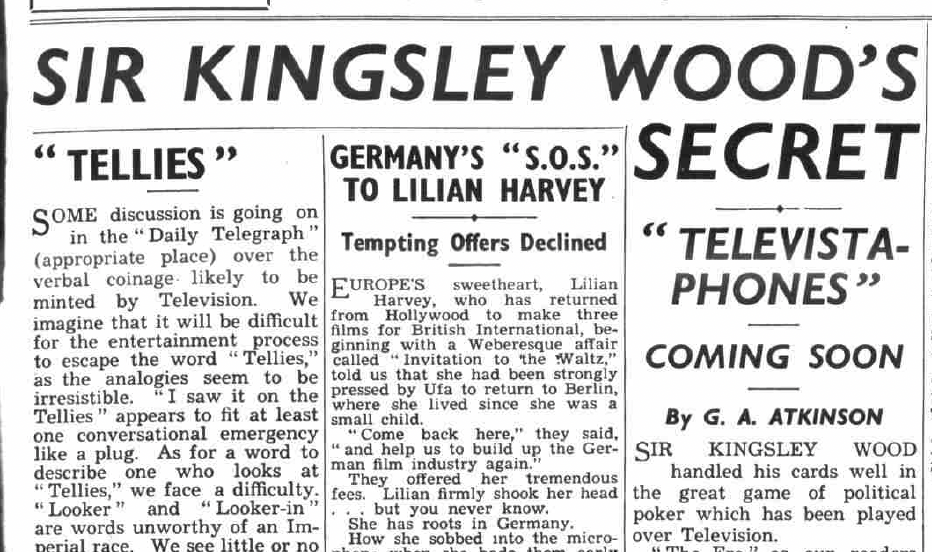OTD in early British television: 6 February 1935

John Wyver writes: readers of The Era daily on Wednesday 6 February 1935 enjoyed two stories about television that, exactly 90 years on, suggest how unstable the very idea of television was then. Under the heading “Tellies” there was speculation about what the paper proposed was ‘the verbal coinage likely to be minted by Television.’
More substantively, the leader headline trumpeted the ‘news’ that Postmaster-General Sir Kingsley Wood had to date said nothing about ‘the coming Television attachments for telephones’. Despite this silence, the paper’s radio correspondent G.A. Atkinson was confident that what he was happy to dub ‘televista-phones’ were ‘coming soon’.
The background to these filings is that The Era was part of the Gaumont-British Picture Corporation (G-BPC), a powerful media conglomerate controlled by Isidore Ostrer. And G-BPC also controlled the Baird company that was developing a television system, including studios at Crystal Palace, that it intended to turn into a commercial enterprise to rival the BBC.
Early February 1935 was a charged moment, just after, as we saw in a recent post, publication of the Selsdon Report, recommending that a ‘high definition’ television service be entrusted to the BBC, but before the Television Advisory Committee had begun to make detailed plans. The future shape of television in Britain was, to a significant degree, undetermined.
The Era, which wonderfully, is available on British Newspaper Archive [fee], is an invaluable source for interwar television, but its stories need to be understood as elements in Ostrer’s complex corporate dance with the BBC, sometimes as a partner and sometimes as a fierce competitor.
Acknowledging that discussion about ‘Tellies’ was being led by the Daily Telegraph, The Era reflected,
We imagine that it will be difficult for the entertainment process to escape the word “Tellies,” as the analogies seem to be irresistible. “I saw it on the Tellies” appears to fit at least one conversational emergency like a plug.
As for a word to describe one who looks at “Tellies,” we face a difficulty. “Looker” and “Looker-in” are words unworthy of an Imperial race. We see little or no hope for such verbal monstrosities as “televiewer”, “specthearer,” “cinemera,” “radioscopt”, “telespector,” and “teloptist”, all of which – and others -h ave been suggested, and “perceivesdropper” is clearly on the way.
We have toyed with the word “telefan”, which can claim some kinship in entertainment, though rooted in “slanguage”. What is certain is that necessity will produce the word, and that we shall probably never know who invented it.
As for the PMG’s supposed ‘secret’, Atkinson was confident that visual telephony, which was a common trope of science fiction films, was just around the corner, but that the dastardly government was failing to reveal how they would benefit from a new river of revenue:
Television will be available for every office and factory. The salesman will be able to show the article to the customer. The lover will be able to see his lass when he rings her up in the morning. Suspects can be identified or photographs verified without travel or trouble.
Hundreds of uses will be found for the “televistaphone”… If Television goes into every office, factory, and institution, and becomes an adjunct of every other domestic telephone, even at only a small fee per annum, well – figure out the revenue for yourself.
No wonder that Sir Kingsley remains calm when he surveys the cost of building a few television stations for entertainment purposes. They are an incident in the prospect.
After which, Atkinson’s column returned to his frequent theme that only a large-scale entertainment combine would be able to set up and run a truly popular television service. Such an initiative would be beyond the capabilities of, say, the BBC, but not, naturally, of his Gaumont-British bosses.
Leave a Reply